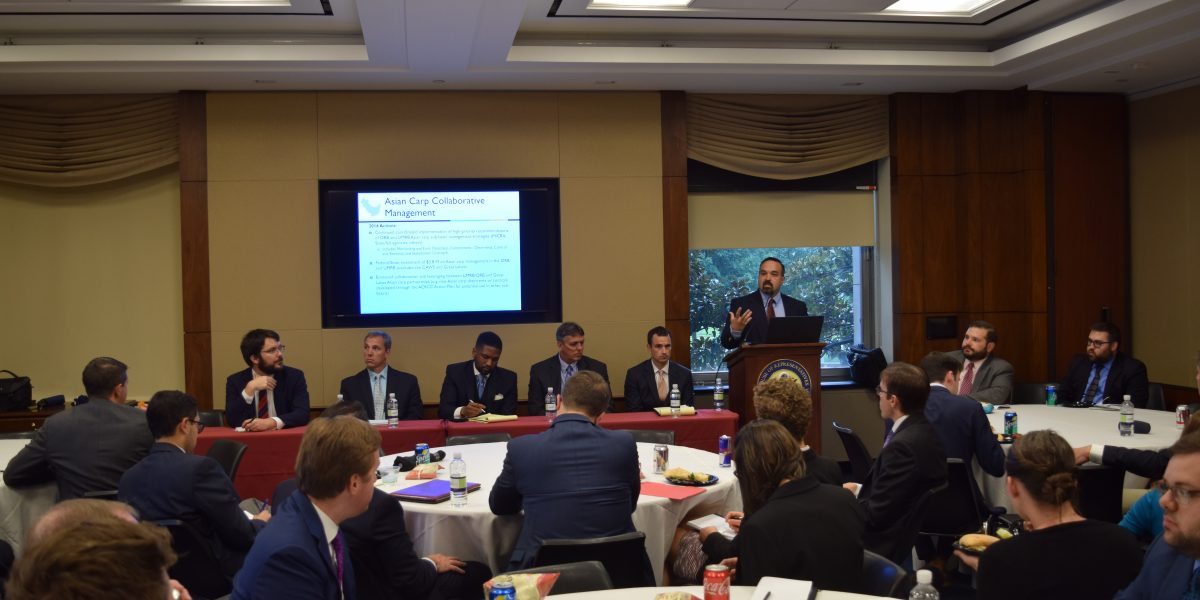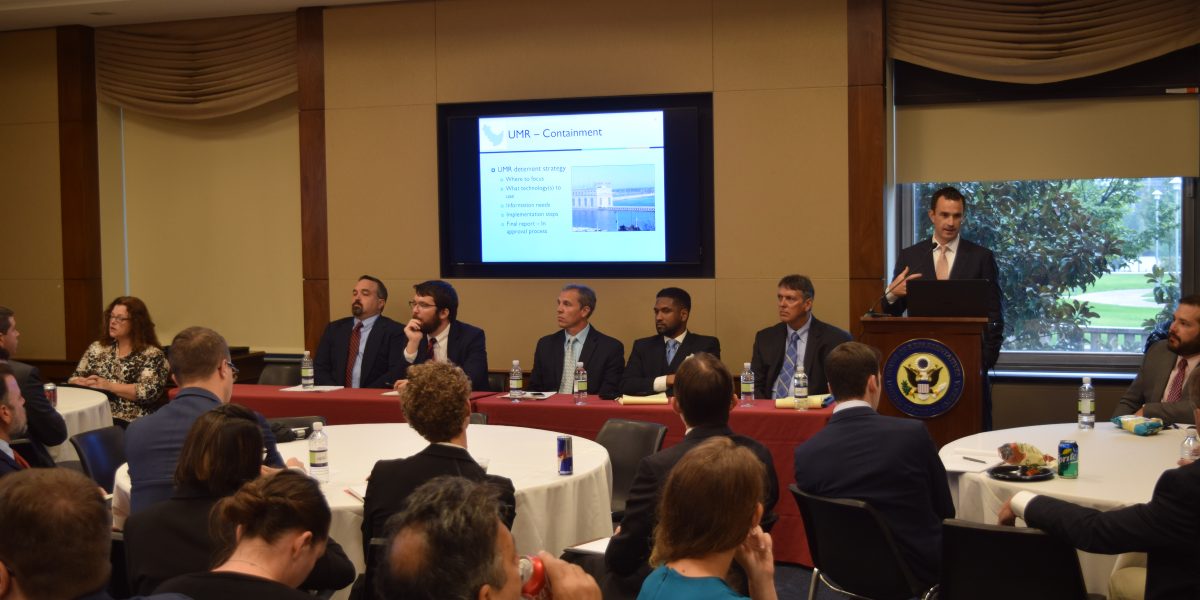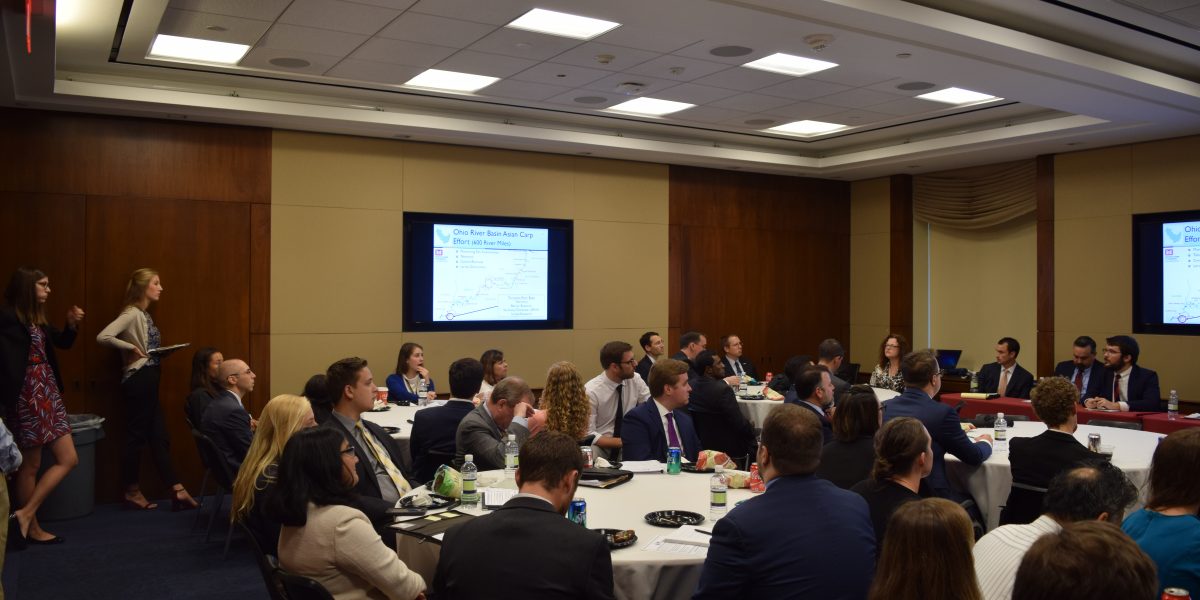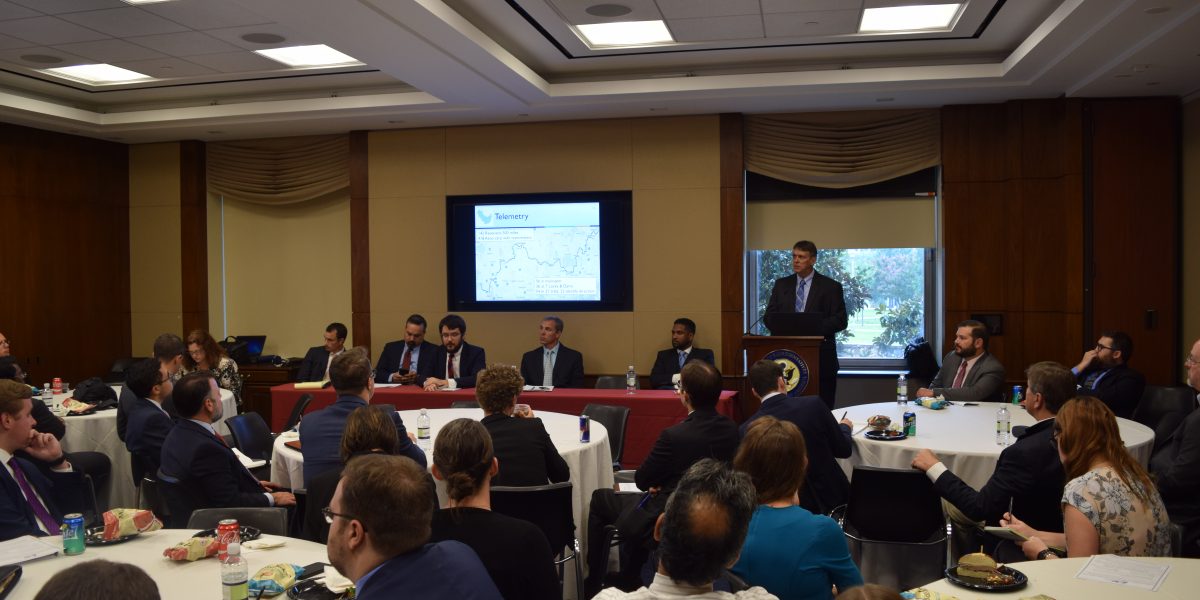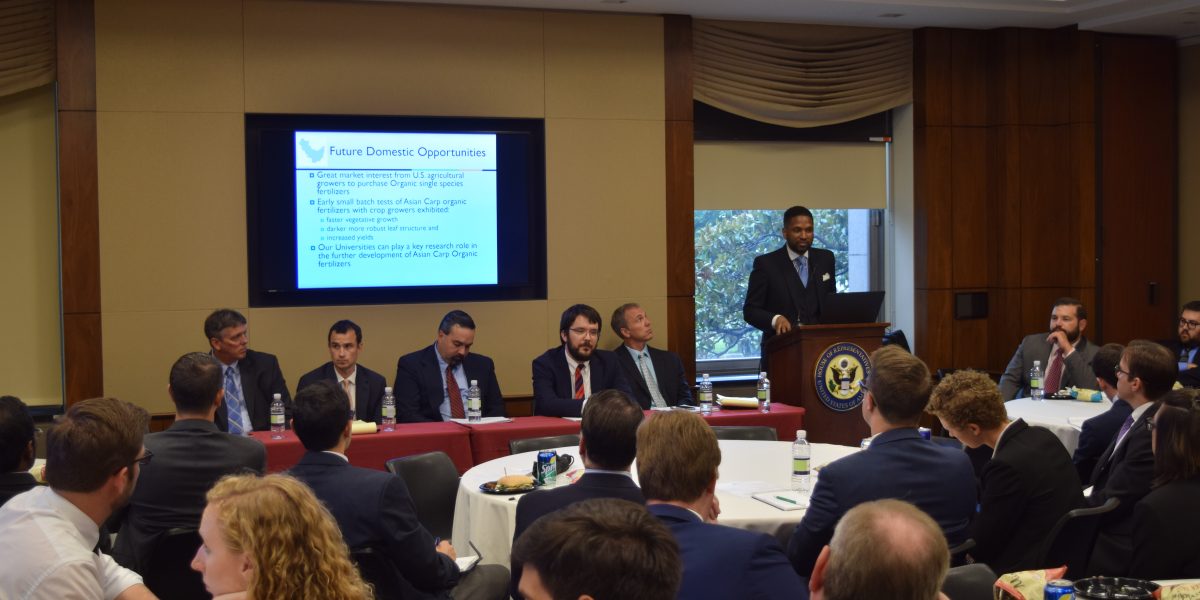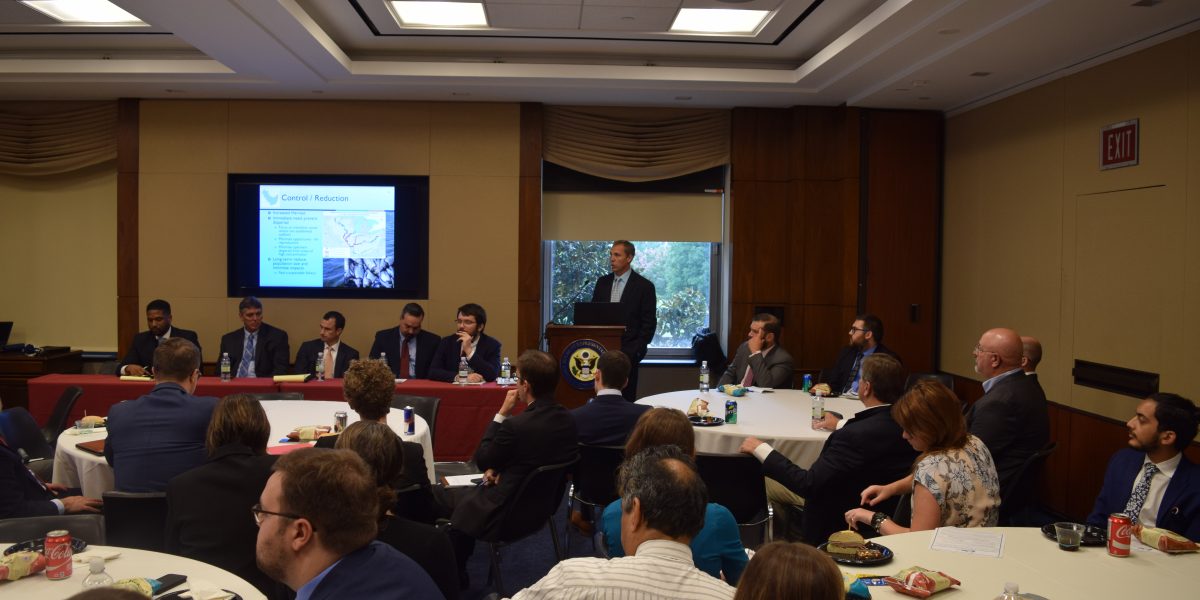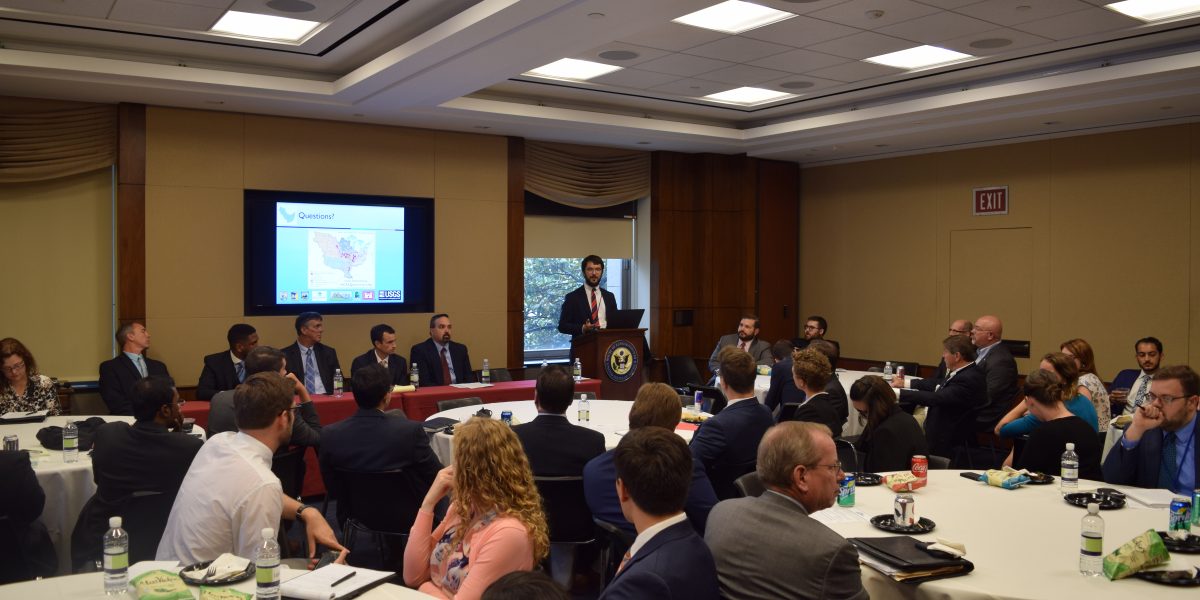BRIEFING MATERIALS:
A full audio recording of the briefing with annotated time stamps can be found 09.06.17%20Asian%20Carp%20Mississippi%20Briefing%20--%20Full%20Recording.mp3?dl=0">here.
To view the presentation slides used in the briefing, please click here.
Management and monitoring of Asian carp in the Mississippi and Ohio River basins were the subjects of a Capitol Hill briefing co-hosted by the Northeast-Midwest Institute and the Mississippi Interstate Cooperative Resource Association (MICRA) on Wednesday, September 6. A panel of experts with representatives from state and federal agencies, along with the private sector, came together to discuss Asian carp monitoring and management with Congressional staff.
Joe Vukovich, Senior Policy Analyst for the Mississippi River Basin Program at the Northeast-Midwest Institute, introduced the panel of speakers, which included:
- Aaron Woldt, Deputy ARD Fisheries, Midwest Region, Fish and Wildlife Service
- Nick Frohnauer, Invasive Carp Representative, Minnesota Department of Natural Resources
- Ron Brooks, MICRA Chairman and Director of Fisheries, Kentucky Department of Fish and Wildlife Resources
- Andre Raghu, CEO of Moon River Foods and Blue Shores Fishery; and
- Greg Conover, MICRA Coordinator, US Fish and Wildlife Service.
Aaron Woldt began the briefing by discussing collaborative strategies for management of Asian carp. He discussed the U.S. Fish and Wildlife Service’s National Plan as well as management efforts related to the Water Resources Reform and Development Act of 2014.
Nick Frohnauer then discussed specific carp control efforts in the Upper Mississippi River Basin. In particular, he stressed the importance of comprehensive monitoring of carp distribution, as well as the roles of new technology and commercial fishing in halting the spread of Asian carp.
Ron Brooks addressed ongoing efforts to control Asian carp in the Ohio River basin. He stressed the importance of comprehensive monitoring and gave an overview of Kentucky’s extensive monitoring and telemetry technology in the Ohio River.
Andre Raghu brought a perspective from the private sector to the briefing. As the CEO of a company that processes Asian carp, he was able to discuss the economic opportunities that can both revitalize fishing communities as well as incentivize private companies to ultimately assist in Asian carp management.
Greg Conover stressed the importance of deterrence and emphasized the continual need to monitor and control the spread of Asian carp. Mr. Conover also discussed the immediate need to prevent dispersal of Asian carp populations while also highlighting the long-term goal of reducing the population of Asian carp and minimizing their impact.
The panelists all stressed the importance of robust data collection to track and monitor the populations of Asian carp in the Ohio and Upper Mississippi River basins. Aggressive monitoring allows agencies to determine which control methods are most successful as well as which areas are most in need of management. The panel also presented an array of specific techniques that are being used to control Asian carp, including eDNA monitoring and acoustic devices which can inhibit the spread of carp. Multiple panelists also mentioned the important role of commercial fishing in carp control efforts and the economic opportunities that are available.
This briefing was co-hosted by the Mississippi River Basin Program (MRBP) at the Northeast-Midwest Institute. Launched in 1995, The MRBP envisions a Mississippi River Basin where livelihoods and the economy can thrive alongside conserved wetlands, restored floodplains, resilient ecosystems, and clean streams. Recognizing the role of informed policy debate in achieving this vision, the MRBP strives to provide detailed research and analysis to policy makers at all levels of government, as well as facilitate discussion and exchange between lawmakers and the region’s stakeholders. You can read more about the MRBP here.
The briefing was also co-hosted by the Mississippi Interstate Cooperative Resource Association (MICRA). MICRA is an organization of 28 state natural resource departments organized in 1991 as a partnership to improve management of interjurisdictional fish and other aquatic resources in the Mississippi River Basin. MICRA’s mission is to improve the conservation, management, development and utilization of interjurisdictional fishery resources (both recreational and commercial) in the Mississippi River Basin through improved coordination and communication among the responsible management entities. You can read more about MICRA here.
